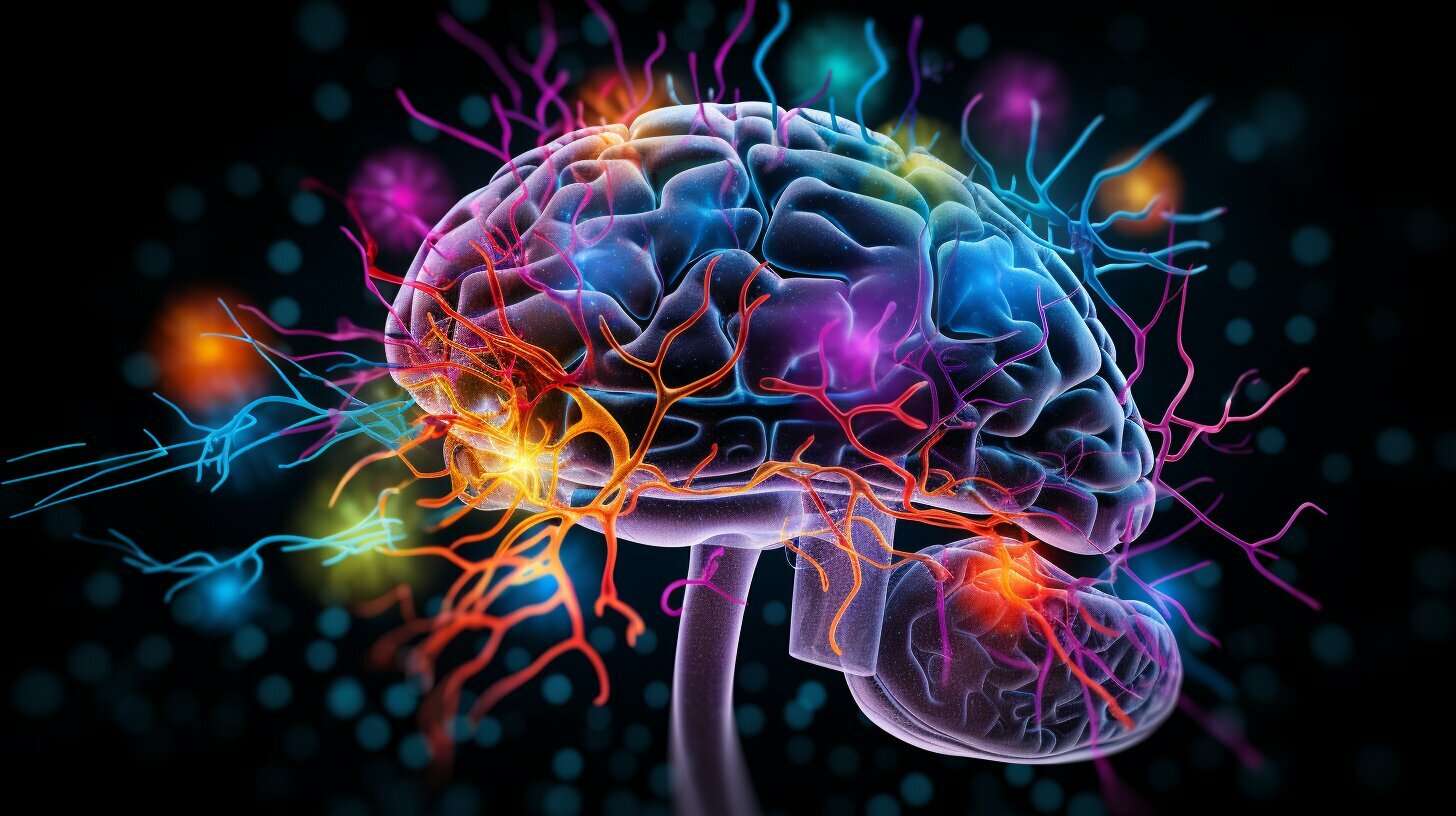Did you know that your gut bacteria could be closely linked to your brain function and health? Recent studies have shown that the thousands of microorganisms found in your gut, known as the gut microbiome, play a significant role in the intricate communication pathway between your brain and gut.
Over the years, gut bacteria have been found to affect various bodily functions, including digestion, the immune system, and metabolism. However, the connection between gut bacteria and the brain has brought about a new wave of research that sheds light on how optimizing gut health can improve mental well-being and cognitive function.
Key Takeaways:
- The gut microbiome is made up of thousands of microorganisms that play a vital role in the gut-brain axis.
- Optimizing gut health can improve mental well-being and cognitive function.
- The connection between gut bacteria and the brain has brought about a new wave of research.
Understanding the Gut-Brain Axis
Have you ever felt butterflies in your stomach before a big presentation or experienced stomach discomfort during a period of stress? These physical sensations are evidence of the gut-brain axis, the communication pathway between the gut and the brain that plays a critical role in both physical and mental health.
The gut is home to millions of microorganisms, collectively called the microbiome, which plays a crucial role in regulating bodily functions. This microbiome communicates with the brain through the gut-brain axis, which includes multiple pathways such as hormonal, neural, and immune signaling mechanisms.
The balance of the gut microbiome is essential for optimal brain function and overall health. Disrupting this delicate balance can lead to a variety of health problems, including cognitive dysfunction, mood disorders, and gastrointestinal issues. Therefore, it is crucial to understand the complex interplay between the gut and the brain and how it can impact our well-being.
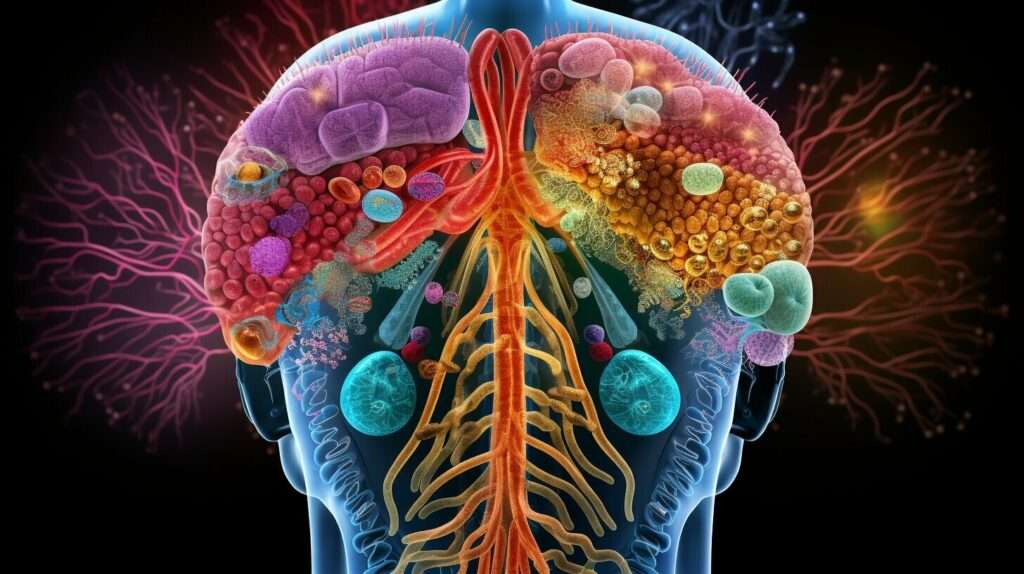
How the Microbiome Influences Brain Function
Research has shown that the microbiome can influence brain function in a variety of ways. For example:
- The microbiome produces neurotransmitters that affect mood and behavior, such as serotonin, dopamine, and GABA.
- The microbiome regulates the immune system, which plays a critical role in brain health.
- The microbiome influences the production of short-chain fatty acids, which can impact brain function and mental well-being.
By understanding the gut-brain axis and the role of the microbiome in regulating bodily functions, we can better appreciate the importance of maintaining a healthy gut microbiome for optimal brain function and overall well-being.
The Impact of Gut Bacteria on Cognitive Function
Gut bacteria play a crucial role in cognitive function, impacting memory, decision-making, and behavior. Research has shown that imbalances in gut bacteria can lead to cognitive decline and mental health issues such as anxiety and depression. Here are some of the ways gut bacteria can affect cognitive function:
- Memory impairment: Studies have found that alterations in gut bacteria can lead to memory problems, particularly in older adults. A healthy gut microbiome, on the other hand, has been associated with better memory performance.
- Difficulty concentrating: Imbalances in gut bacteria have been linked to decreased attention and focus, making it harder to concentrate on tasks.
- Mood disorders: The gut-brain axis plays a crucial role in regulating mood, and disruptions in the gut microbiome can lead to mood disorders such as anxiety and depression.
Overall, maintaining a healthy gut microbiome is vital for optimal cognitive function and mental well-being.
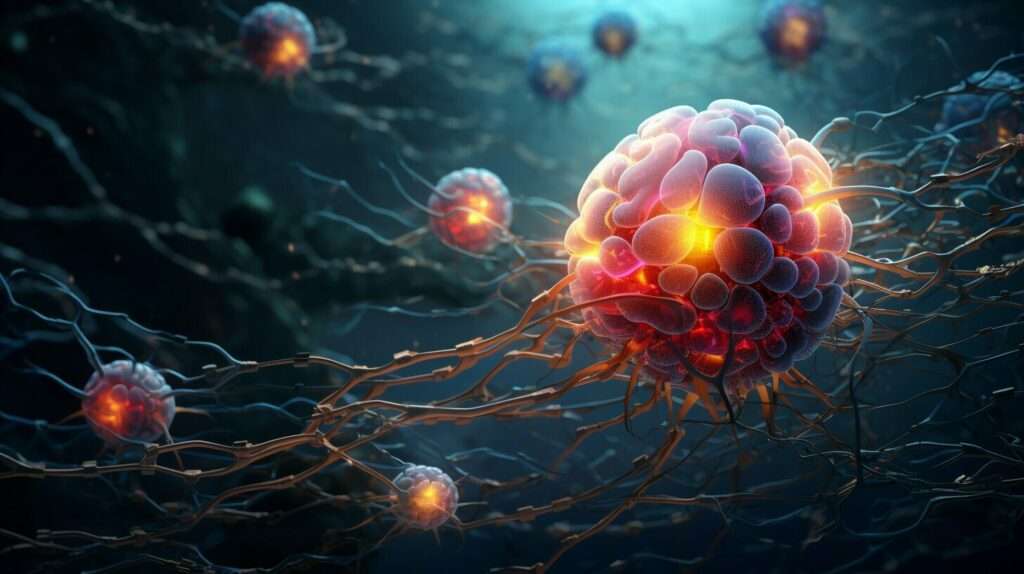
Gut Bacteria and Mental Health
Your gut bacteria play a crucial role in your mental health. Studies have found that imbalances in gut bacteria can contribute to conditions such as anxiety, depression, and stress. When your gut microbiome is not in balance, it can cause inflammation in the body, which may impact the brain and lead to mental health issues.
“The gut microbiome has been shown to influence brain function and behavior, and disturbances in its composition are associated with a variety of mental health disorders.” – Dr. Emeran Mayer, Professor of Medicine and Executive Director of the G. Oppenheimer Center for Neurobiology of Stress and Resilience at UCLA
One study found that individuals with depression had lower levels of certain types of gut bacteria, while another study discovered that mice fed a certain type of bacteria showed improvement in anxiety-like behavior. These findings suggest that optimizing your gut microbiome may have a positive impact on your mental well-being.
Additionally, gut bacteria produce neurotransmitters such as serotonin and dopamine, which are involved in regulating mood. Having a healthy balance of gut bacteria may contribute to the production of these neurotransmitters and help improve your overall mood.
Optimizing your gut health through dietary changes, probiotics, and other lifestyle factors may help alleviate the symptoms of mental health conditions. However, it is important to note that these interventions should not replace medical treatment for diagnosed mental health disorders. Consult with your healthcare provider for personalized advice.
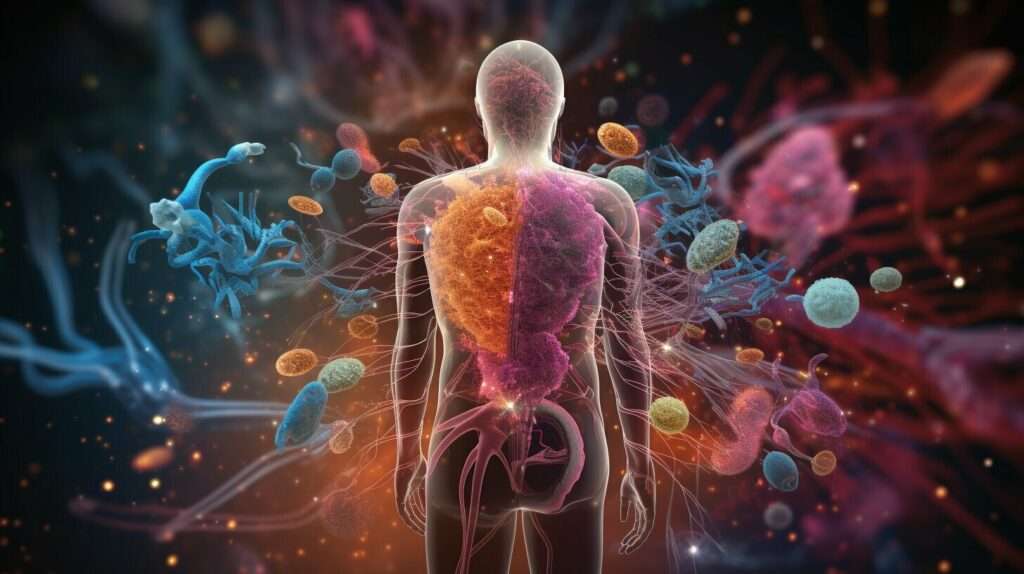
The Influence of Gut Bacteria on the Digestive System
It’s no secret that a healthy digestive system is crucial for overall well-being, and gut bacteria play a significant role in maintaining that balance.
The collection of microorganisms in the gut helps break down food and absorb nutrients, and it also plays a role in preventing gastrointestinal issues such as irritable bowel syndrome and inflammatory bowel disease.
Research has shown that an imbalance in gut bacteria can lead to digestive problems, including bloating, gas, and constipation. Therefore, nurturing a healthy gut microbiome is key to maintaining proper digestive function.
| Food Group | Examples | Benefits |
|---|---|---|
| Probiotics | Yogurt, Kefir, and Kimchi | Introduces good bacteria to the gut |
| Prebiotics | Garlic, Asparagus, and bananas | Feeds and nourishes existing good bacteria |
| Fiber | Whole grains, Fruits, and vegetables | It increases bowel regularity and promotes healthy gut bacteria growth |
Probiotics, prebiotics, and fiber-rich foods such as fruits, vegetables, and whole grains are essential for promoting a healthy gut microbiome.
In addition, reducing processed foods, sugar, and alcohol can also help maintain a healthy gut. These foods can disrupt the balance of gut bacteria and lead to inflammation in the digestive system.

Remember, a healthy gut means a healthier you. Nurturing a balanced gut microbiome through proper diet and lifestyle choices can lead to improved digestive function and a happier gut.
Nurturing a Healthy Gut Microbiome
To maintain a healthy gut microbiome, focus on a balanced diet that includes plenty of whole, plant-based foods. Incorporate a variety of fruits, vegetables, whole grains, and legumes, which provide essential vitamins, minerals, and fiber that support gut health.
Probiotic-rich foods such as yogurt, kefir, and fermented vegetables like sauerkraut and kimchi can also help promote a healthy balance of gut bacteria. Prebiotic foods, which feed the good bacteria in your gut, include garlic, onions, leeks, asparagus, and bananas.
Another way to support gut health is to prioritize lifestyle factors such as stress management and regular physical activity. Chronic stress can negatively impact gut bacteria, so finding healthy ways to manage stress, such as meditation or yoga, can promote a healthy gut microbiome. Exercise has also been shown to positively impact the gut microbiome and improve overall gut health.
Additionally, consider taking a high-quality probiotic supplement, especially if you have taken antibiotics recently or have a history of gut issues. When selecting a probiotic, look for one that contains a variety of different strains of bacteria and has a high CFU (colony-forming units) count.
Overall, by nourishing your gut microbiome with a balanced diet, probiotic and prebiotic foods, stress management, regular exercise, and potentially a probiotic supplement, you can support optimal gut health, which in turn may positively impact brain function and overall well-being.
The Power of Probiotics
Probiotics are live microorganisms that have been shown to have beneficial effects on gut health. They work by helping to restore balance to the gut microbiome and promote the growth of beneficial bacteria. Studies have linked the use of probiotics to improvements in digestive issues, immune function, and even mental health.
In one study, participants who consumed probiotic yogurt for four weeks experienced improvements in brain function and reduced levels of stress and anxiety. Another study found that a specific strain of probiotic bacteria helped improve symptoms of depression and anxiety in patients with irritable bowel syndrome.
When selecting a probiotic supplement or probiotic-rich food, look for those that contain a variety of beneficial strains, such as Lactobacillus and Bifidobacteria, and aim for a high CFU count (at least 10 billion CFUs per serving).

“By nourishing your gut microbiome with a balanced diet, probiotic and prebiotic foods, stress management, regular exercise, and potentially a probiotic supplement, you can support optimal gut health, which in turn may positively impact brain function and overall well-being.”
Gut Bacteria and the Aging Brain
As you age, changes in your gut microbiome can have significant effects on brain function and cognitive decline. According to recent research, these changes may be due, in part, to a decrease in microbial diversity and an increase in harmful bacteria.
One study found that older adults with higher levels of inflammatory gut bacteria had decreased cognitive performance and smaller hippocampal volumes, which are important for memory. Other research has linked imbalances in gut bacteria to neurodegenerative diseases such as Alzheimer’s and Parkinson’s.
While there is still much to learn about the connection between gut bacteria and the aging brain, there is hope for interventions that can maintain a healthy microbiome and potentially slow cognitive decline. Some potential strategies include dietary changes, probiotics, and fecal microbiota transplantation (FMT).
One study showed that a Mediterranean-style diet, rich in fruits, vegetables, nuts, and fish, can improve cognitive function and increase microbial diversity. Probiotic supplements, such as lactobacillus and bifidobacterium strains, have also been shown to have positive effects on brain function in older adults.
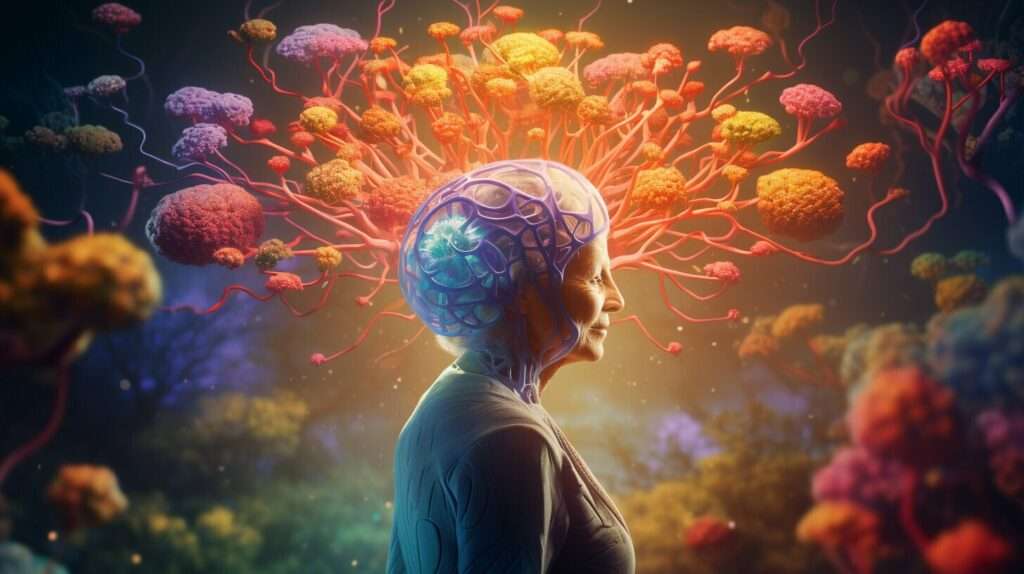
FMT, while still an emerging therapy, has shown promise in treating certain gut-related diseases and may have the potential for brain health as well. By transferring healthy fecal matter from a donor to a recipient, FMT can help restore microbial diversity and balance in the gut.
Overall, maintaining a healthy gut microbiome is crucial for promoting brain health and preventing cognitive decline as you age.
The Future of Gut-Brain Research
As the link between gut bacteria and brain function continues to gain recognition in mainstream science, the potential for developing new therapies and interventions is becoming increasingly promising. Researchers are still looking into how probiotics, prebiotics, and fecal microbiota transplants can be used to change the gut microbiome and improve mental health and brain function.
Furthermore, advancements in technology have allowed for the development of more precise and comprehensive methods for studying gut bacteria and their effects on the brain. For example, the use of advanced imaging techniques can provide insight into the intricate workings of the gut-brain axis.
The future of gut-brain research holds the potential for revolutionary breakthroughs in healthcare, particularly in the treatment and prevention of neurological disorders such as Alzheimer’s and Parkinson’s diseases. By furthering our understanding of the connection between gut bacteria and brain function, we can develop targeted interventions that promote optimal gut health and cognitive well-being.
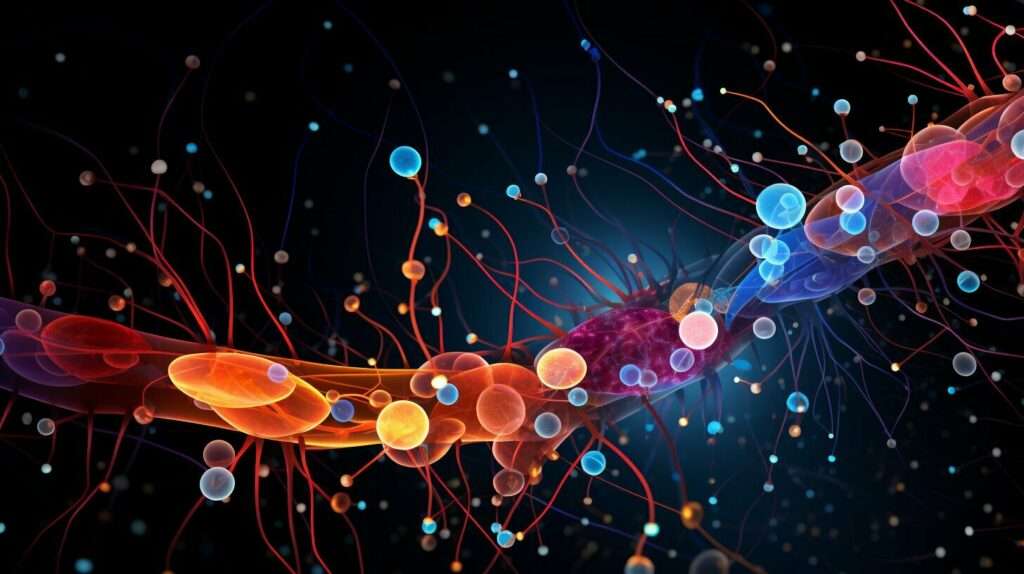
“Ongoing research is exploring the use of probiotics, prebiotics, and fecal microbiota transplants as methods for manipulating the gut microbiome to improve brain function and mental health.”
Conclusion
As you have learned throughout this article, gut bacteria play a crucial role in brain function and overall health. The gut-brain axis and microbiome have a powerful connection that impacts cognitive function, mental well-being, and the digestive system.
Imbalances in gut bacteria have been linked to issues such as memory problems, difficulty concentrating, and mood disorders, while nurturing a healthy gut microbiome through a balanced diet, probiotics, prebiotics, and healthy lifestyle habits can positively impact brain function and gut health.
It is also important to note that changes in gut bacteria composition with age can influence cognitive decline and neurodegenerative diseases, making the maintenance of a healthy gut microbiome even more crucial as we age.
The Future of Gut-Brain Research
The future of gut-brain research is promising, with ongoing studies and advancements in this field. The potential for developing therapies that target the gut microbiome to improve brain function and mental health is significant and may have implications for future healthcare.
In conclusion, maintaining a healthy gut microbiome is essential for optimal brain function and overall well-being. By incorporating the practical tips and strategies outlined in this article, you can take proactive steps toward nurturing a healthy gut microbiome and improving your quality of life.
FAQ
Q: What is the gut-brain axis?
The gut-brain axis is a bidirectional communication pathway between the gut and the brain. It involves complex interactions between the gut microbiome, the collection of microorganisms in the gut, and the central nervous system.
Q: How do gut bacteria influence brain function?
Gut bacteria have been found to play a significant role in brain function. They produce neurotransmitters, chemicals that transmit signals in the brain, and influence the immune system and inflammation, both of which can impact neurological processes.
Q: Can imbalances in gut bacteria affect cognitive function?
Yes, imbalances in gut bacteria have been linked to cognitive issues such as memory problems, difficulty concentrating, and mood disorders. Scientific studies have shown that optimizing gut bacteria can help improve cognitive function.
Q: Is there a connection between gut bacteria and mental health?
Yes, there is a strong connection between gut bacteria and mental health. Imbalances in gut bacteria have been associated with conditions such as anxiety, depression, and stress. Nurturing a healthy gut microbiome can potentially improve mental well-being.
Q: How do gut bacteria influence the digestive system?
Gut bacteria play a crucial role in maintaining a healthy digestive system. They aid in the digestion and absorption of nutrients, help prevent gastrointestinal issues, and contribute to the overall balance of the gut environment.
Q: What can I do to nurture a healthy gut microbiome?
To nurture a healthy gut microbiome, it is important to consume a balanced diet rich in fiber, probiotics, and prebiotics. Lifestyle factors such as regular exercise, stress management, and adequate sleep also contribute to optimal gut health.
Q: Are there any implications of gut bacteria on the aging brain?
Yes, changes in gut bacteria composition with age can influence cognitive decline and the development of neurodegenerative diseases. This highlights the importance of maintaining a healthy gut microbiome throughout your life to support brain health.
Q: What is the future of gut-brain research?
The future of gut-brain research holds promising potential for developing therapies that target the gut microbiome to improve brain function and mental health. Ongoing studies are uncovering exciting advancements in this field.


